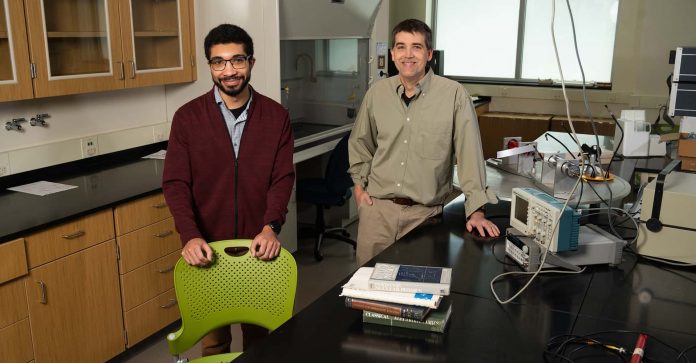If two trains traveling at different speeds in different directions towards the same platform come to mind when you hear the word physics — the study of matter and how it behaves through space and time — it is time to reexamine what you know about the subject. The idea that physics is just memorized equations and theories is a discredit to how nuanced and grand the subject actually is. In fact, says Evan Finch, associate professor of physics at Southern Connecticut State University, there are aspects of physics that actually border on philosophy and deeper, existential issues, like what reality really is.
“Science isn’t in a book and it isn’t all known,” Finch says. “We know only about 15 percent of what the universe is made of, and there are huge questions to be solved. It’s kind of interesting how little we know.”
According to Finch, he was lukewarmly “fine” at physics in high school — an assertion that hardly seems possible considering he’s become an expert on particle/nuclear physics; his work has widely been published in different academic journals; and he is a STAR collaborator and a co-chair of the group involved in the chiral magnetic effect (CME) search.
Everything changed when he got to college and learned about Einstein’s theory of relativity during a physics course.
“My mind was blown,” he says. “It was the idea that time moves differently for different people. After that [physics] just got more interesting.”
Finch changed his major to physics and has held fast to the sense of wonder ever since.
His experience rings true to Elliott Horch, chairperson/CSU professor, physics, who admits that college-level physics is not what you learn in high school-level physics.
“Physics teaches you how things really work,” he says. “It’s everything from particles in the atom to how galaxies interact and everything in between. Many students [who are] in pre-engineering and students who come to Southern not thinking about physics see how amazing the universe is and get totally turned on by that.”
“Physics appeals to students who might be interested in engineering or building things,” Horch says. “In our department we have an engineering concentration, so if a student finds they’re interested in that, there’s opportunities to conduct experiments.”
Speaking of experiments, they’re exciting, yes, but Finch cautions not instantaneously so.
“Usually, physics concepts are big problems that need to be tackled a little bit at a time. So problem solving is key. Experiments can involve hundreds of people and many years of work,” Finch says. “Often you’ve recorded observations, and it’s over the course of many years, and the analysis takes years too. It’s a progressive field.”
Recent results of his own research, conducted as part of a large particle-physics collaboration at Brookhaven National Lab, which is supported by the U.S. Department of Energy’s (DOE) Office of Science, continued a line of his work reaching back more than 20 years.
The team announced a major result last fall using the Relativistic Heavy Ion Collider, a powerful particle accelerator operated by the lab. Horch calls the null-result in the experiment, which creates questions about our understanding of the fundamental nature of the strong nuclear force that holds matter together and how it behaves in high-energy particle interactions, “one of the most important to come out this year worldwide.”
In Finch’s case, patience — in the form of 20 years — paid off but, he says, “you also have to learn to take disappointment because you might not find the results you were looking for.”
Surprisingly, passion also can play a role. You might not think it goes hand-in-hand with physics, but according to physics graduate student Deandre Xavier Lesley, ’23, if you have enough of it, it gets you through the memorization and equations in the beginning years. “Toward the later years,” he says, “when the subject becomes less memorization and more application, the passion carries you through.”
Like Finch, Lesley did not discover his love for physics until college. As an undergraduate student in Florida, he studied astronomy and astrophysics as a double major in computational mathematics. After attending an astronomy lecture, he started emailing with a professor who introduced him to Horch. Based on those conversations, Lesley decided he wanted to enroll in the Master of Science program in Applied Physics at Southern.
“It seemed like it would be a great fit me, and so far it has been,” he says.
Students in Southern’s physics program can expect to learn from classwork, a capstone project, and hands-on experiences in the way of internships and state-of-the-art program labs, which gives students access to everything from the very small, nanotechnology, to the largest, astronomy.
In addition, “the works of Southern’s scientists have been cited extensively,” says Horch, “which is an indication of the works’ importance. In terms of the research impact of our faculty members, we are right up at the top.”
So, if you have a burning question about the basic workings of the universe, you might want to take a closer look at physics.
“It isn’t ‘just stuck in a classroom,’” promises Finch. “It’s a wonderful thing. Using physics, you can describe the universe in beautiful ways mathematically. There’s wonder there. It’s not just memorizing the questions; it’s about understanding what they mean. It takes a lot of thought. So get in there and give it a try, you never know what’s going to hook you.”


